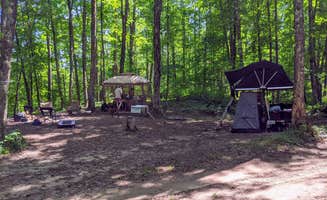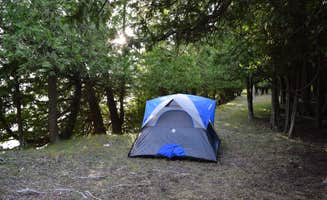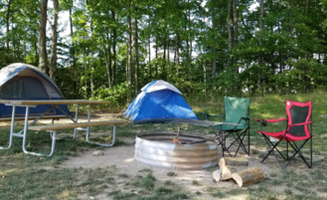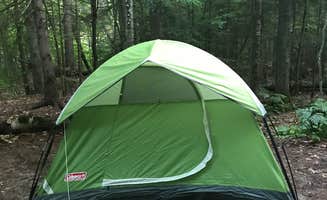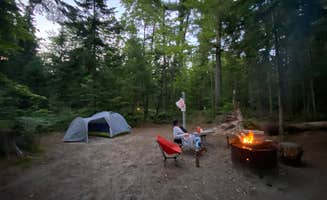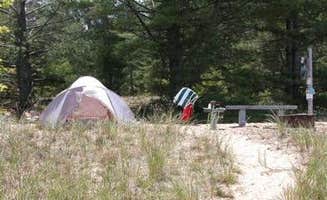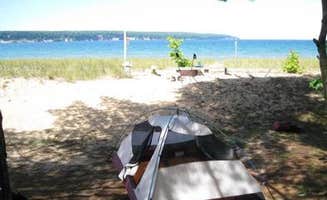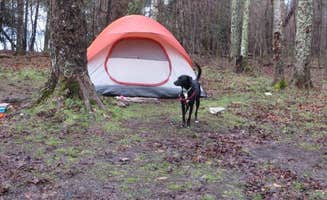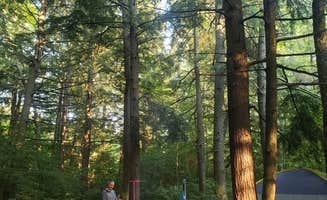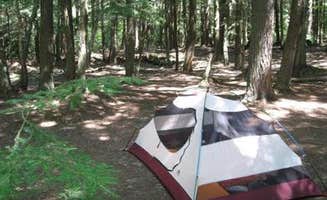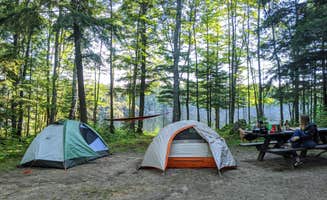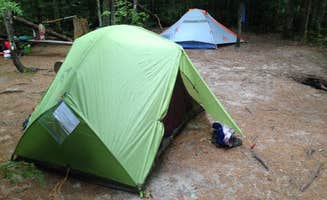Dispersed tent campsites near Nahma, Michigan offer multiple low-traffic camping options in Hiawatha National Forest at elevations between 580-620 feet above sea level. Summer temperatures typically range from 55-80°F with higher humidity near lakeshores. Winter camping requires specialized equipment as temperatures often drop below 20°F with significant snowfall accumulation.
What to do
Fishing opportunities: Corner Lake Campground provides direct lake access where anglers can catch smallmouth bass and northern pike. The fishing spots are easily accessible from most sites without a long hike.
Hiking trails: At Ewing Point Rustic Campsite, campers can access Bruno's Run Hiking Trail near the parking area. According to Jessica J., "Very large site with a pit toilet nearby and two access points to Bruno's Run Hiking Trail (9 miles) near the parking area."
Wildlife viewing: South Gemini Lake State Forest Campground offers excellent bird watching opportunities from lakeside sites. Mike K. describes it as a "Great little campground in the middle of nowhere. 15 minute drive off the beaten path keeps the crowds away."
Stargazing: The remote locations of most Nahma area campgrounds provide excellent night sky viewing opportunities due to minimal light pollution. Sites with lake access offer unobstructed horizon views for optimal star viewing.
What campers like
Scenic water views: Several campsites at Peninsula Point Lighthouse Access Road - Dispersed offer direct sightlines to Lake Michigan. Jacob B. spent "6 nights and loved all of it. I was in the camp more south on the left. Caught northern lights, Milky Way, and glorious sights every day."
Off-grid experience: Many tent campers appreciate the disconnected nature of Nahma's dispersed sites. One camper noted, "We had a great time. The 'camp' spots are about 1 mile before the lighthouse and outhouse bathrooms."
Privacy between sites: The dispersed camping areas typically provide good spacing between established camping areas. A camper at Ironjaw Lake Dispersed Campsite reported, "There is a permitted site at the end but multiple pull out spots for dispersed camping along the forest road."
Lake swimming access: Many sites provide direct water access for swimming during summer months, though water remains cool even in July and August. "We were lucky, we went pre-season. We did have to clear a bunch of down trees to get down the road but we had the site and the lakes to ourselves," noted Willow M.
What you should know
Site availability challenges: The limited number of designated tent sites can create availability issues, especially during summer weekends. As Neil T. observed about Peninsula Point, "Pretty area, but not many spots. Taking your chances on an open spot."
Bathroom facilities: Most dispersed sites offer primitive toilet facilities. Evi L. noted that Peninsula Point has "a really neat old lighthouse with pit toilets at the end of the road. It's a one lane road btw, with multiple cutouts in the road for passing."
Road conditions: Forest service roads can deteriorate seasonally. A reviewer at Ironjaw Lake reported, "Long nice road with a few pull offs once you are close to the end there is one official site with a table and fire circle."
Cell service limitations: Connectivity is spotty throughout the region. Shawn T. noted at Ironjaw Lake, "No service with mint" cellular service, and other carriers have similar coverage gaps.
Weather preparedness: The peninsula location creates rapidly changing weather conditions. Pack extra layers even in summer when temperature drops can be sudden, especially near shorelines.
Tips for camping with families
Safest swimming areas: The gentle shoreline at Rock Island State Park Campground provides kid-friendly water access. Karnpal C. notes, "All sites are hike-in, with the backpack-designated sites (A-D) being about a mile hike from the ferry dock."
Easier access sites: For families with young children, consider sites closer to parking areas. Some campers recommend bringing a cart for gear transport. Sites 15 and 16 at Rock Island are frequently mentioned as good options for families.
Wildlife education opportunities: Many campsites provide excellent opportunities to observe and learn about local birds, deer, and smaller mammals. Bring field guides specific to Upper Peninsula wildlife.
Activity preparation: The remote location means limited entertainment options beyond nature exploration. Bring games and activities that don't require electricity or internet. "They do have a small building that contains outdoor equipment (balls, frisbees, bocce ball etc) to use," notes Liz M.
Tips from RVers
Road clearance requirements: Forest roads accessing dispersed sites often require vehicles with higher clearance. Shawn T. notes that at Ironjaw Lake, "We stayed in our car just in case."
Size limitations: Most dispersed camping areas near Nahma can only accommodate smaller trailers or campervans. Big rigs should look for established campgrounds with designated RV sites.
Generator restrictions: Check regulations before bringing generators. Many sites prohibit generator use to maintain the natural quiet for all campers.
Water access planning: No hookups are available at dispersed sites. Ron F. from Indian River Campground recommends bringing "at least one gallon per person per day" for drinking and cooking when staying at dispersed tent campsites without water access.


